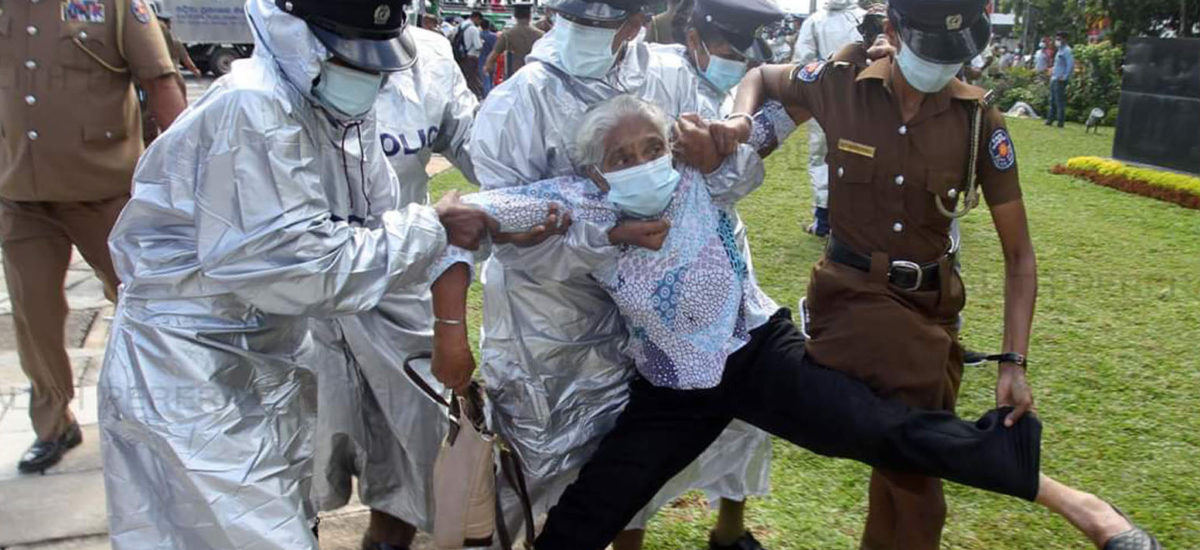Photo courtesy of Sri Lanka Brief
Sri Lankan student activists have been arrested for protesting against militarisation and privatisation in higher education. This is yet another example of misuse of laws supposedly aimed at stopping the spread of COVID-19 in order to increase state power and crush dissent.
After a protest near Parliament on August 3, five people were arrested a few days later on charges of violating inter-provincial travel restrictions. They included Inter University Students’ Federation (IUSF) convenor Wasantha Mudalige and president of the Sri Jayewardenepura University Students’ Federation Amila Sandeepa. Both leaders were brought before a magistrates’ court and remanded until August 11 while the three others arrested were granted bail.
The demonstration had been against the Kotelawala National Defence University (KNDU) bill. In recent months, discontent has spread across various sections of the population. Those in charge have tried to head off dissent, including claiming that protests might threaten public health.
Yet supposed concern by the authorities about the risk of coronavirus infection has been highly selective. For instance, they have seemed unconcerned by gatherings in support of ruling party politicians, nor have they taken firm and decisive action to protect factory workers labouring in dangerous conditions despite repeated calls.
While admittedly the pandemic has left governments across the world with tough challenges and tricky decisions around restrictions, measures to protect ordinary Sri Lankans without connections in high places have been patchy. Instead, the situation has been exploited to crack down on disagreement and reduce accountability still further, as pointed out by democracy and human rights activists at home and abroad.
Police abuses have increased under cover of the pandemic and anti-drug measures, Human Rights Watch has said. These include alleged extrajudicial killings, torture and arbitrary detention. International partners should suspend assistance until the government has acted on these, the organisation urged.
“Sri Lanka’s police seem intent on building on their past record of serious abuses, instead of cleaning up their act,” said Meenakshi Ganguly, the South Asia director. “The UN, UK, and others working with Sri Lankan law enforcement should recognize that without the political will to reform on Sri Lanka’s part, their engagement risks appearing to endorse abusive agencies.”
The Bar Association of Sri Lanka had expressed concern that allegations of causing hate or disunity or obstructing the COVID-19 programme should not be misused “in order to stifle the freedom of speech and expression which is a fundamental right enshrined in the Constitution”. In July it shared its “grave concern at the arrests and detention of protestors by the Sri Lanka Police ostensibly for violating Health Regulations relating to COVID-19… Public protests straddle three important Fundamental Rights in the Constitution namely the Freedom of Speech and Expression, the Freedom of Peaceful Assembly and the Freedom of Association” and “strengthen the Freedom of Thought”. “Any restrictions on public health grounds must be reasonable,” the Bar Association said.
The decision to bring people together in large numbers and potentially cause congestion, under current circumstances, should not be taken lightly. Yet if people do not exercise core freedoms now, vital rights may be lost and public wellbeing undermined even further. Many are already concerned about the state of the education system and fear that the KNDU bill will further undermine this.
At best, universities are places where critical thinking is encouraged and the views and experiences of the poor and marginalised are taken seriously. Student protesters deserve better than the heavy-handed response they have met, as do all who speak out for a more equal and compassionate society.
Human rights also play an important part in protecting and improving public health, especially for those facing disadvantage and discrimination. The pandemic has shed light on some of the injustices which have left large swathes of the population even more exposed.


